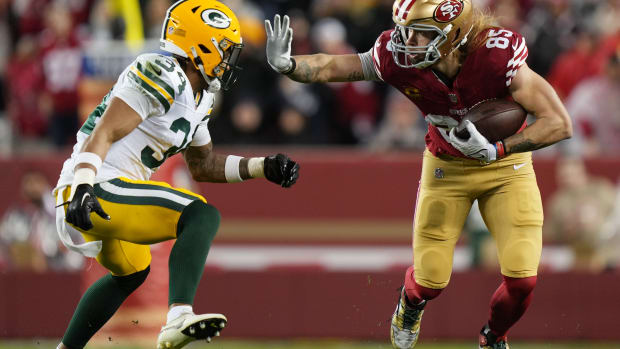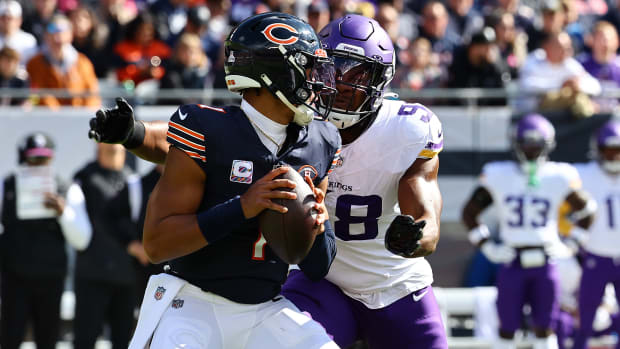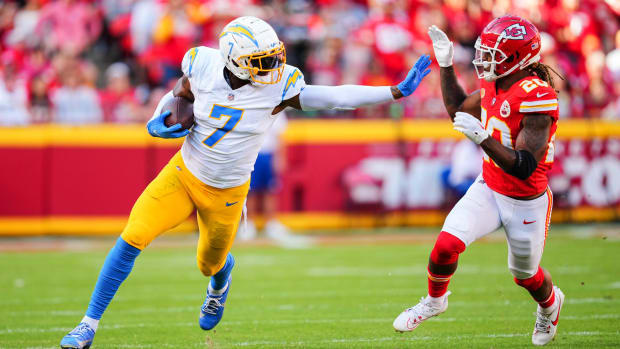Where Ryan Pace Has Placed His Chips
The NFL personnel game often falls between a guessing game and an inexact science.
GMs hit on players, whether they are draft picks or free agents. At other times GMs wind up with egg in their face after taking or signing players who fall flat on their faces.
Success is success any way it's sliced, but the cost of failure depends largely on when it occurs.
For instance, Bears GM Ryan Pace failed miserably on wide receiver Kevin White. Injuries had little to do with White's total inability to play, because he had plenty of opportunity after he healed. These weren't career-threatening injuries like ligament tears. But he wasn't good.
Because White was Pace's very first pick, it was easily absorbed as they moved on. A Pace critic would say they moved on to more failures, but Pace had his successes, as well.
The same type of thing can happen with free agency. The Pernell McPhee signing never met expectations but came early on in the regime. Pace was able to make a trade for a player at the same position and Khalil Mack is the basis for their defense.
Now in his seventh season, Pace no longer has the comfort zone provided by time.
The Bears enter a pivotal season for both their coach and GM.
They can't afford to be wrong on many players after team CEO Ted Phillips said they need to see a playoff victory and board chairman George McCaskey said they need to see progress.
Here are the players Pace can least afford to be wrong about this season.
5. Eddie Jackson
If Jackson experiences another season like last year, after getting a $58.4 million from the Bears, there will be real questions asked. Some will be of Jackson, probably more of Pace. It was Pace who decided Jackson and not Adrian Amos was the key safety to keep because teams really can't afford two highly paid safeties. Jackson was deemed the superior player by Pace.
With two interceptions in 2019 and none last year, and a passer rating against of 110.1 when targeted in 2020, Jackson did little to justify his big deal. Meanwhile, with the Packers in the last two seasons Amos has four interceptions, passer ratings against of 85.5 and 85.7, and Pro Football Focus gave him the second highest rating of all safeties last year (89.9) and 15th highest in 2019 (75.7).
4. Andy Dalton
Justin Fields isn't on the list. Andy Dalton is.
Let's face it, if Fields doesn't produce much as a rookie because he doesn't play much or still hasn't figured out the league yet, no one will hold it against Pace much. A rookie quarterback rarely has a positive impact. Patrick Mahomes didn't have one as a rookie. Justin Herbert played well but didn't have a positive impact on his team's 6-9 record. Josh Allen had a horrendous 67.9 rookie passer rating and the Bills were 5-6. The Cardinals were 5-10-1 in Kyler Murray's first year and he averaged a Mitchell Trubisky-like 6.9 yards an attempt. Pace will likely be patted on the back in the unlikely event Fields immediately comes in and dominates. If Fields has positive days and negative days, the pick isn't likely to impact Pace until down the line, if he is even in Chicago then.
If Pace's future is staked to success this year, it has to come from Dalton.
If Fields takes the normal rookie path then Dalton is going to have to win games for the Bears this year and make sure the regime continues.
3. Robert Quinn
If Quinn fails to turn it around in a big way, Pace will be held entirely responsible for a player who took $33 million guaranteed and contributed little. With two sacks and six quarterback hits last year, Quinn put Pace directly in the firing line. If Quinn does succeed, though, it can mean an entirely different result for the team than last year's sporadic rush produced. Dominant edges on both sides means better protection for a questionable secondary.
2. Desmond Trufant
The only positive here was Pace didn't pay him much. He's backed up by an enitrely inexperienced Kindle Vildor, so Trufant has to be the player who can replace Kyle Fuller. Pace really took a gamble by bringing in an injury prone replacement and a second-year player from a small school to challenge him. There were other options a the time. Cornerback is a position capable of bringing down a team faster than any other except possibly quarterback. The Bears' GM has put his faith in two players who'd be bucking the odds if they succeeded.
1. Teven Jenkins
Relying on any rookie as a starter is a risk. Doing it at a position protecting the quarterback's blind side is rolling the dice. The positive for Pace is first-round tackles are normally good percentage bets. Last year nine of the first 11 tackles drafted started 11 games or more. In fact, 13 of the first 18 drafted started at least 11 games.
However, there is a greater risk factor involved with Jenkins and it's been created entirely by Pace. Jenkins started one game at left tackle his final year and three games each of the previous two Oklahoma State seasons. Behind him Pace has put Elijah Wilkinson, who has never started a game at left tackle in the NFL. There is no one else on the roster who played left tackle in the NFL. Rookie Larry Borom dabbled at it a few games at Missouri but was a right tackle and a guard. Arlington Hambright was a left tackle much of the time as Jenkins' teammate but has been considered more of a guard since coming to the Bears last year in the seventh round.
If this Pace gamble doesn't work out immediately, the result could eventually be a left tackle they sign off of waivers following final roster cuts, one who hasn't played in their offensive system.
Twitter: BearDigest@BearsOnMaven




